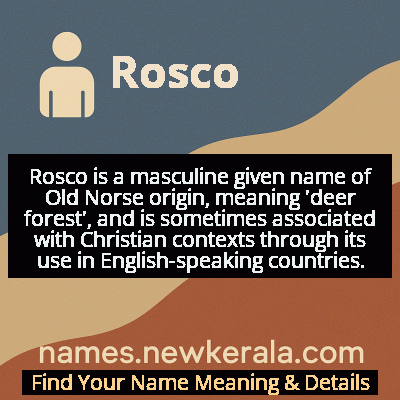Rosco Name Meaning & Details
Origin, Popularity, Numerology Analysis & Name Meaning of Rosco
Discover the origin, meaning, and cultural significance of the name ROSCO. Delve into its historical roots and explore the lasting impact it has had on communities and traditions.
Name
Rosco
Gender
Male
Origin
Christian
Lucky Number
7
Meaning of the Name - Rosco
Rosco is a masculine given name of Old Norse origin, meaning 'deer forest', and is sometimes associated with Christian contexts through its use in English-speaking countries.
Rosco - Complete Numerology Analysis
Your Numerology Number
Based on Pythagorean Numerology System
Ruling Planet
Neptune (Ketu)
Positive Nature
Intuitive, analytical, spiritual, and inquisitive.
Negative Traits
Secretive, reserved, aloof, and can be overly critical.
Lucky Colours
Green, yellow.
Lucky Days
Monday.
Lucky Stones
Cat’s eye, moonstone.
Harmony Numbers
1, 5, 6.
Best Suited Professions
Scientists, researchers, spiritual leaders, detectives.
What People Like About You
Depth of knowledge, analytical skills, spirituality.
Famous People Named Rosco
Rosco Gordon
Musician
Pioneered the 'Rosco rhythm' that influenced early rock and roll and ska music
Rosco P. Coltrane
Fictional law enforcement
Iconic television sheriff from The Dukes of Hazzard, known for comic relief and catchphrases
Rosco McGlashan
Racing driver
Australian land speed record holder and innovative vehicle designer
Rosco B. Sweeney
Fictional character
Memorable antagonist in the classic musical The Music Man
Name Variations & International Equivalents
Click on blue names to explore their detailed meanings. Gray names with will be available soon.
Cultural & Historical Significance
Extended Personality Analysis
People named Rosco are often characterized by their grounded nature and practical approach to life. They typically exhibit strong problem-solving skills and a no-nonsense attitude that makes them reliable in crisis situations. Their connection to the name's natural meaning often manifests as an appreciation for outdoor activities, environmental awareness, and physical pursuits. Roscos tend to be loyal to their core values and relationships, displaying steadfastness that others find comforting and trustworthy. They often possess a quiet confidence that doesn't need constant validation, combined with a dry wit that emerges in comfortable settings. While they may appear reserved initially, Roscos typically have deep emotional intelligence and strong observational skills. Their personality blends traditional masculinity with modern sensitivity, creating individuals who are both strong protectors and empathetic companions. This combination of traits makes them particularly effective in leadership roles that require both practical decision-making and interpersonal understanding.
Modern Usage & Popularity
In contemporary naming practices, Rosco occupies an interesting niche as a distinctive but not overly unusual choice. While it hasn't appeared in the Social Security Administration's top 1000 names in recent decades, it maintains consistent usage particularly in regions with strong outdoor or rural traditions. Modern parents selecting Rosco often appreciate its strong consonant sounds, two-syllable structure, and connection to nature themes that are increasingly popular in baby naming. The name fits well with current trends favoring vintage revivals and nature-inspired names while avoiding being overly common. Its usage patterns show particular strength in Southern states, rural communities, and among families with English or Scottish heritage. The name's association with beloved pop culture characters gives it recognition value without being tied exclusively to any single reference. Current data suggests Rosco appeals to parents seeking a masculine name with character that won't be shared by multiple classmates, positioning it as a sophisticated alternative to more popular nature-themed names like Hunter or River.
Symbolic & Spiritual Meanings
Symbolically, Rosco represents the intersection of natural wisdom and human community, embodying the qualities of both the wild deer and the cultivated heathland. The roe deer symbolizes awareness, grace under pressure, and the ability to navigate challenging terrain—qualities that translate to emotional intelligence and adaptability in human terms. The heathland represents open possibilities, resilience in harsh conditions, and the beauty of untamed spaces. Together, these symbols create a powerful metaphor for balanced living: maintaining wildness of spirit while participating in community, honoring tradition while embracing change. The name suggests someone who can move between different social environments with ease, much like deer transition between forest and field. In spiritual terms, Rosco symbolizes the journey of finding one's path while remaining connected to roots and heritage. This rich symbolic tapestry makes the name particularly meaningful for those who value both independence and belonging, nature and civilization, tradition and innovation.

